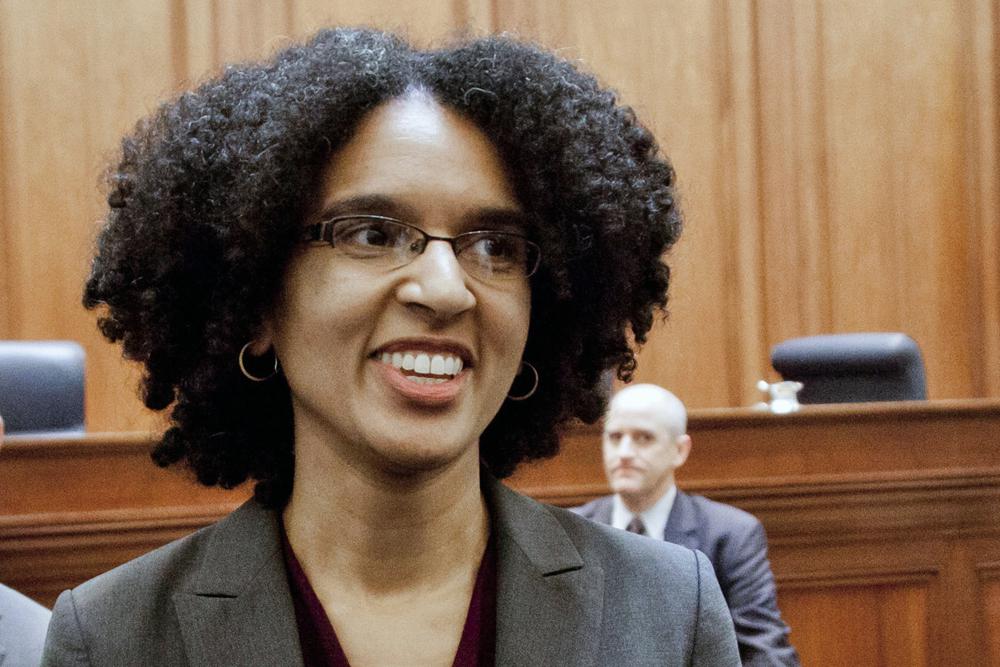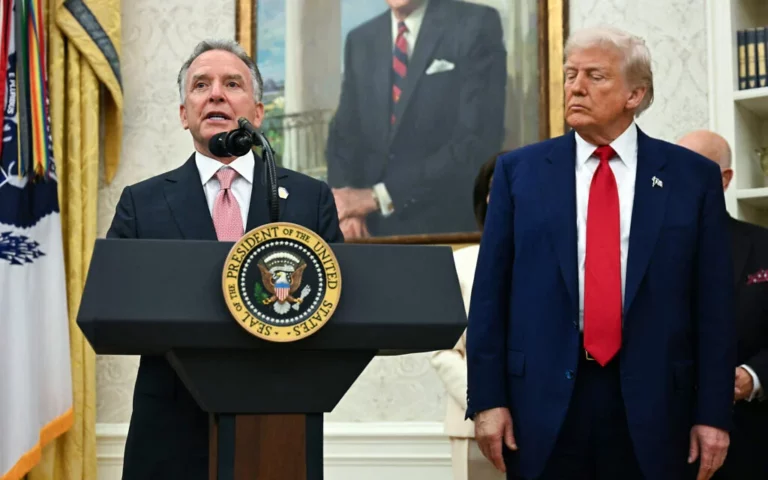Supreme Court Justice Stephen Breyer’s retirement gives President Joe Biden a chance to make his first nomination to the high court. It’s also a chance for Biden to fulfill a campaign promise to nominate the first Black woman to be a justice.
Some things to know about the women seen as leading candidates:
KETANJI BROWN JACKSON
Ketanji Brown Jackson has known Breyer for decades. A graduate of Harvard and Harvard Law school, she was a law clerk to Breyer from 1999 to 2000. She is comfortable enough with her former boss to have a little fun at his expense. In 2017, after Breyer accidentally brought his cellphone to court and it rang, Jackson introduced him at an event and pretended to get a call mid-introduction from Breyer’s colleague, Justice Neil Gorsuch.
After clerking for Breyer, Jackson was as a lawyer in private practice, worked as a public defender and served on the U.S. Sentencing Commission. President Barack Obama nominated her to be a federal trial court judge in the District of Columbia in 2013. Biden elevated her to the U.S. Court of Appeals for the District of Columbia Circuit, where she has served since June 2021.
Recently, Jackson was part of a three-judge panel that ruled against former President Donald Trump’s effort to shield documents from the House committee investigating the Jan. 6, 2021, insurrection at the Capitol.
Jackson, 51, also has the advantage of a connection to Republicans. She is related by marriage to former House Speaker Paul Ryan, R-Wis. Jackson’s husband, Dr. Patrick Jackson, a surgeon, is the twin brother of Ryan’s brother-in-law. The judge and her husband have two daughters.
___
LEONDRA KRUGER
Leondra Kruger would be the first person in more than 40 years to move from a state court to the Supreme Court if she were to be chosen and confirmed as Biden’s nominee. The last justice Sandra Day O’Connor, a barrier-breaker who was the court’s first female justice. O’Connor was an Arizona Court of Appeals judge when nominated by President Ronald Reagan in 1981, fulling his campaign promise to put a woman to Supreme Court.
Kruger, 45, has been on the California Supreme Court since 2015. She was just 38 when chosen for the job by then-Gov. Jerry Brown. She’s seen as a moderate on the seven-member court.
Kruger grew up in Los Angeles. She is the daughter of a Jamaican mother and Jewish father; both are pediatricians. She attended Harvard before getting her law degree from Yale. Like Jackson, she was a law clerk to a Supreme Court justice — John Paul Stevens.
Before moving back to California, Kruger worked for the Department of Justice. She argued a dozen cases before the Supreme Court on behalf of the federal government, including one involving religious schools’ ability to fire teachers.
Kruger is the first California Supreme Court justice to have a baby while serving on the court. She and her husband have two children.
___
J. MICHELLE CHILDS
J. Michelle Childs’ resume doesn’t include a law degree from Harvard or Yale or service on a federal appeals court, common characteristics of the current justices. But she has a powerful backer who has Biden’s ear: Rep. James Clyburn, D-S.C.
Clyburn and Biden are longtime friends. Clyburn’s pivotal endorsement of Biden before South Carolina’s Democratic presidential primary in February 2020 is seen as critical in Biden’s path to the nomination.
Childs, 55, is a graduate of the University of South Carolina School of Law. She has a master’s degree from the school as well as a different legal degree from Duke.
She was previously a state court judge and has served as a federal trial court judge since 2010. In 2014, before the Supreme Court ruled that gay couples had a right to marry nationwide, she ruled in favor of a gay couple seeking to have their District of Columbia marriage recognized in South Carolina.
Biden nominated her in December to be a federal appeals court judge on the U.S. Court of Appeals for the District of Columbia Circuit, but senators have yet to act. Among the current justices, only Justice Elena Kagan wasn’t a federal appeals court judge before joining.
___
SHERRILYN IFILL
If Biden decided to go outside the judiciary, the choice could be NAACP Legal Defense and Educational Fund head Sherrilyn Ifill, 59. She is a deeply respected civil rights lawyer who has held the post since 2013. Ifill, who has announced she will step down in the spring, is the second woman to lead the organization.
Ifill started her career at the American Civil Liberties Union, then worked on voting rights legislation at the legal defense fund before she joined the faculty at University of Maryland School of Law, where she taught for more than 20 years. Ifill graduated from Vassar College and earned her law degree from New York University School of Law in 1987. She was among the group of lawyers named to study the Supreme Court by Biden in 2021.
She’s a prolific author and writer, and in February of last year wrote an opinion column in The New York Times on how the legal profession must reckon with the fact that lawyers helped President Donald Trump by enabling him to effort “the most dangerous assault on American democracy in more than a century,” through his meritless lawsuits challenging the election, efforts to install a sympathetic attorney general who would help him, and by the growing movement in Congress to adopt Trump’s election lies.
___
HOLLY THOMAS
Holly Thomas, 43, was just confirmed to the largest federal appeals court last week, the San Francisco-based U.S. Court of Appeals for the 9th Circuit. She is the second Black woman ever to sit on the court.
Thomas is a graduate of Stanford University and Yale Law School. She had been in the Family Law Division of the Los Angeles Superior Court since 2018, and before that she was the deputy director of executive programs at the California Department of Fair Employment and Housing.
She has also worked at the NAACP Legal Defense and Education Fund, and was as an appellate attorney in the Justice Department’s Civil Rights Division.
She overcame a party-line vote deadlock in the Senate Judiciary Committee, requiring an additional floor vote to move her forward after Republicans questioned her ability to separate her prior advocacy for progressive issues from her work as a judge. During her time in the New York Solicitor General’s office, she filed briefs advocating for policies that allowed transgender people to use the bathrooms that correspond to their gender identity. At her confirmation hearings, she said she was more than able to set aside her work in order to fairly serve as a judge.
___
EUNICE LEE
Eunice Lee, 51, was named to the U.S. Court of Appeals for the 2nd Circuit in August, the first former federal defender to serve on the court. Her appointment was lauded as a recognition of the need to broaden the judiciary’s legal expertise, particularly because defense lawyers are not a common choice for such posts.
Lee graduated from Ohio State University and Yale Law School. She then clerked for U.S. District Court Judge Susan J. Dlott, and later for Judge Eric Clay on the U.S. Court of Appeals for the 6th Circuit. She spent time from 1998 to 2019 at the office of the appellate defender in New York City and also taught clinical law at New York University Law School.
(AP)












9 Responses
A scary group of contenders, to say the least
I want to see the group that isnt limited to skin color and gender.
Ohevet White Lawyers from Harvard and Yale: Where were your concerns for the past 200 years when the pool of candidates implicitly screened out distinguished lawyers from other racial and economic backgrounds and diverse legal scholarship and training??
What exactly do you find scary? These are all well qualified and impressive women. All would make better judges then any of djt picks.
Biden keeps on showing his racism time and time again.
I’m sure they are all qualified to serve as Supreme Court Judges…The US is degrading into a third world country.
To Ohevet Yisroel: I remember back in 1950’s, 60’s and 70’s how often you said the same thing you posted here. It’s about time they listened to you.
GH: I don’t think Ohevet was alive 200 years ago, so don’t pin it on her. Besides, didn’t you ever hear “two wrongs don’t make a right”?
GHT and huju lie as usual. There has NEVER been a time when “distinguished lawyers from other racial and economic backgrounds and diverse legal scholarship and training” were “screened out”. For most of our history there WERE no such “distinguished lawyers…”. When they began to exist they were always in the pool of potential judges and justices, but they were a small fraction of that pool.
And no, these are not “all well qualified and impressive women”. It’s possible that the best person for this vacancy will turn out to be a black woman, but it’s not at all likely.